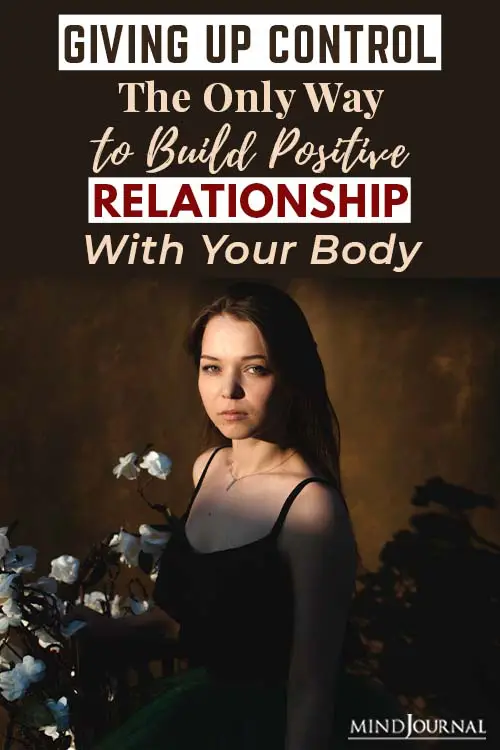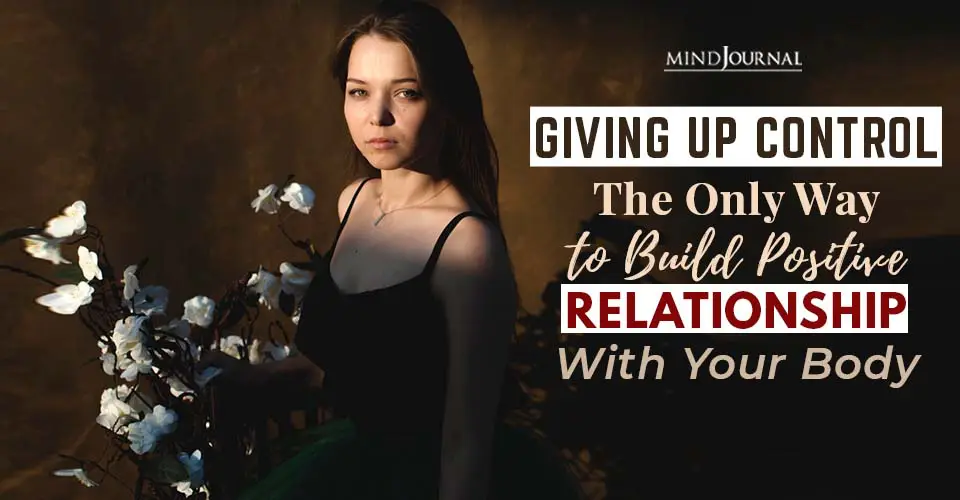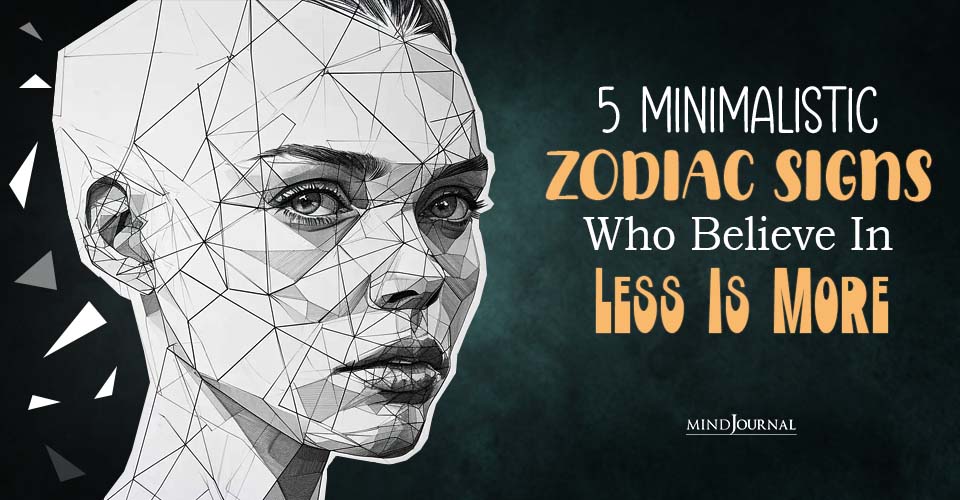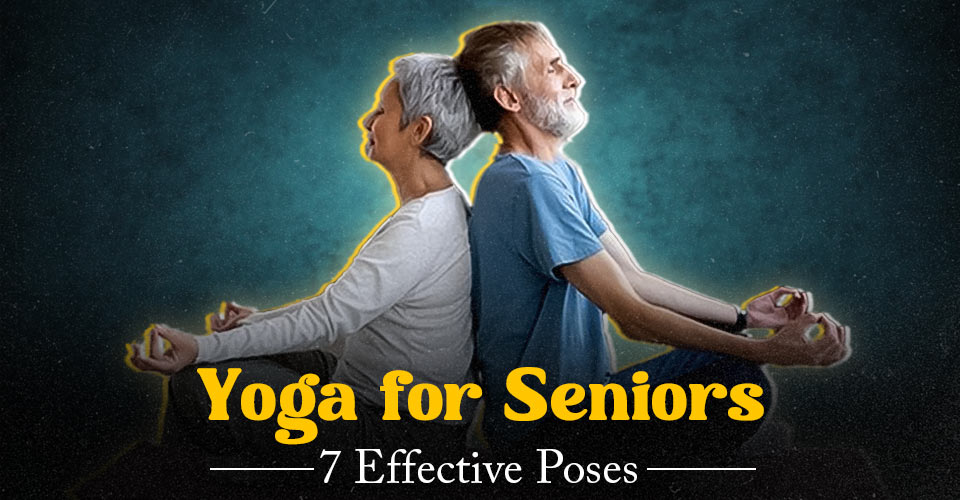Struggling with body image often means simultaneously struggling with food and exercise. Giving up control over food and exercise is the mantra to build a more positive relationship with your body.
- Yo-yo dieting causes people to feel out of control.
- Being unable to lose weight makes people develop a self-concept around being lazy, weak, or lacking in willpower because they can’t “get it together” to eat healthy and move more.
- Learning to control one’s body using rigid and punishing food and exercise habits leaves people with a feeling of panic and paranoia that they can’t relax, or everything will completely fall apart.
No matter what a person’s specific experience is, there is often a belief that the ideal relationship with food and exercise centers around control.
This is firmly rooted in diet culture of course, which is firmly invested in making us all believe that our bodies want to get fat and that we have to ignore, repress, and deny all our natural bodily cues—and instead use our superior brains to come up with a plan for what to eat, and how much, and when.
Why?
Because when we believe that, diet culture makes money. (In 2019, the U.S. Weight Loss & Diet Control Market was worth $72 billion. This couldn’t exist if people trusted their bodies instead of trying to control them.)
Diet culture is a fascinating, complex, and highly effective hoax. But it is a hoax.
Read 5-Step Game Plan For Building A Positive Body Image
It’s fake news that we have to use willpower in order to have a healthy body. It’s untrue that we have to spend time, money, and energy controlling something which, if left alone, would have effortlessly controlled itself.
Sometimes when I think about diet culture, I think it’s kind of like if our culture convinced everyone that their well-being and worthiness for respect depended entirely on them scrubbing out a self-cleaning oven by hand on a daily basis.
The only benefit would be to the people who sold cleaning supplies. For everyone else it’s just… fucked up.
I say all this because it’s important to acknowledge why people end up with an obsessively control-based approach to food and exercise. Adopting a controlling approach to food and exercise is the natural outcome of growing up in diet culture, and it’s not a personal character flaw or failing. (Hence why such a huge percentage of eating disorders begin as recreational diets, and then spiral.)
That said, it also doesn’t work.
Controlling and restricting your food intake leads to obsessing over food, eventually bingeing, and for the majority of people, gaining weight. (If you’re not familiar with anti-diet concepts yet, please read the books Anti-Diet and The F*ck It Diet.)
Read Why Body Image Has Nothing To Do With How Your Body Looks
For a lot of people, the hard-to-swallow truth is this:
The harder and longer you try to control your weight, the more out-of-control you’ll feel.
Likewise, the longer and harder my clients have tried to control their bodies, the less they tend to like their bodies. Which makes “control my body” a super shitty plan for body confidence.
This is why, when my clients tell me that they want a more positive relationship with food and their bodies, I tell them that we will need to work on giving up control.
Here’s the deal: love and control are mutually exclusive—love requires a certain amount of trust to exist, and control is the opposite of trust.
Imagine if a person went to a marriage counselor and said “I want a better marriage,” and when the counselor asked what a perfect marriage looked like, they responded with “I would make all decisions for my partner, and they would never speak.” Personally, I would say that doesn’t sound like a better marriage, it sounds like a dictatorship.
And yet when I ask clients what their ideal relationship to food and body would be, it often sounds a lot like that.
People imagine that they can like, love, or accept their bodies, while also repressing their body’s needs, denying it’s signals, and cutting it off from having any agency. And it just doesn’t work that way.
You cannot truly love someone and also control them. (And I don’t know who needs to hear this, but someone else can’t truly love you and also try to control you either. That’s not love.)
You cannot truly feel care for, respect, accept, like, or love your body… while also trying to control it.
So if you want a more positive relationship with your body, you’ll need to learn how to give up control over food and exercise.
This means giving your body a voice: learning to tune in, listen to, believe, and decipher it’s signals to you when it comes to food and movement. It means building trust in your body’s ability to self-regulate in a healthy place for you when it comes to weight, even if that place isn’t where you want it to be. It means giving up diets forever, giving up food rules and limitations, giving up the endless hours of cardio and other body-controlling exercises.
Please don’t misunderstand me: giving up control over your body is not easy.
Read Grief Work Body Image: How Grief Helps In Your Journey of Body Neutrality
It’s actually extremely scary, difficult, painful, and time consuming. It takes time and practice and patience and compassion and support.
But giving up control over food and exercise is the way—the only way, in my experience—to build a more positive relationship with your body.
Let me know if you need support in this area, by the way. Learning to let go of control is exactly what I help my private coaching clients do.
Sending you big self-trusting vibes today,
<3
Jessi
Written by: Jessi Kneeland Originally appeared on: Jessikneeland.com Republished with permission.









Leave a Reply
You must be logged in to post a comment.